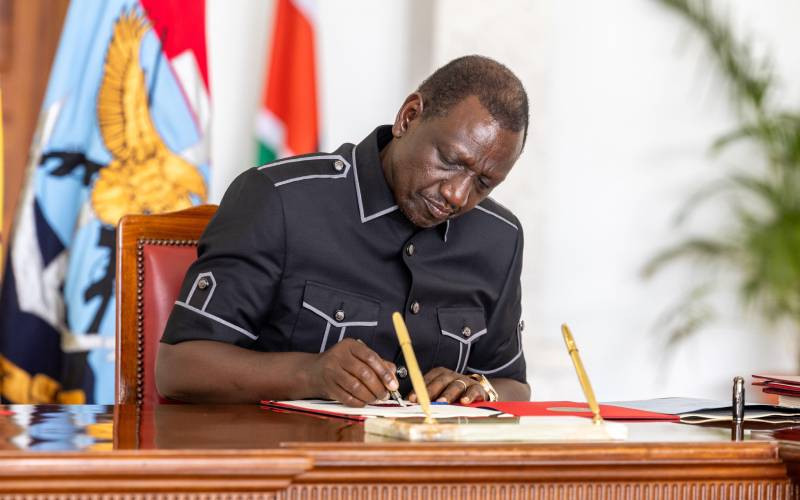 |
|
Primary Schools Head Teachers goes through text books during The Kenya Primary Schools Head Teachers Association(KEPSHA) Annual Delegates Conference at Sheikh Zayed Children Centre,Mombasa. [PHOTO:BONIFACE OKENDO] |
Kenya: The cost of books and other learning materials is expected to more than double over the next two years as the impact of the controversial Value Added Tax (VAT) Act 2013 hits the educational sub-sector.
Publishers yesterday warned that the quality of education in the country stands to be compromised due to the increased cost of education books and other learning materials.
Through their umbrella body, Kenya Publishers Association (KPA), the publishers noted that prices of learning material have gone up by up to 40 per cent since the enactment of the tax law last year.
"We are already witnessing suppressed demand for textbooks. The cumulative effect of this law is that prices of books have gone up by between 35 and 40 per cent and within the next two years, we expect to see the cost of books double," explained Chairman Lawrence Njagi at a media briefing in Nairobi yesterday.
"The moment you tax books, what happens immediately is that people quietly stop buying. Our children are not really learning due to difficulties in accessing learning books," he added.
The contentious VAT law 2013, which attracted a lot of public protest, imposed a 16 per cent tax on school study materials, which were previously zero-rated.
The new tax measure covered exercise books, dictionaries, geographical maps, instructional charts and diagrams, children's pictures, drawing and colouring books, as well as other printed books and examination papers.
Treasury did not spare freight, insurance and services related to imported goods that were slapped with a 16 per cent Vat charge, which equally had a negative impact on learning materials. It is argued that the cost of education has since risen and its quality is declining as parents' spending is overstretched.
The Government's budget allocation of Sh1,020 per child per year for instructional materials under the Free Primary Education (FPE) is hardly enough, as the funding has not factored the increased costs..
The publishers also want the process of supplying books to be devolved, arguing that funds meant for the acquisition of books have in most cases been mismanaged. According to KPA, booksellers are currently owed close to Sh1 billion by schools. The amount represents the cost of books supplied to schools on credit since January this year (2014).
"We are actually making a demand to the ministry to try and change the system so that book supplies can be done at the county level," said Njagi.
Njagi reckons that the publishers have prepared a Text Book policy whose approval by the Ministry of Education could bring sanity to the whole system of procurement, supplies and audit of books and other learning materials.
 The Standard Group Plc is a
multi-media organization with investments in media platforms spanning newspaper
print operations, television, radio broadcasting, digital and online services. The
Standard Group is recognized as a leading multi-media house in Kenya with a key
influence in matters of national and international interest.
The Standard Group Plc is a
multi-media organization with investments in media platforms spanning newspaper
print operations, television, radio broadcasting, digital and online services. The
Standard Group is recognized as a leading multi-media house in Kenya with a key
influence in matters of national and international interest.
 The Standard Group Plc is a
multi-media organization with investments in media platforms spanning newspaper
print operations, television, radio broadcasting, digital and online services. The
Standard Group is recognized as a leading multi-media house in Kenya with a key
influence in matters of national and international interest.
The Standard Group Plc is a
multi-media organization with investments in media platforms spanning newspaper
print operations, television, radio broadcasting, digital and online services. The
Standard Group is recognized as a leading multi-media house in Kenya with a key
influence in matters of national and international interest.








